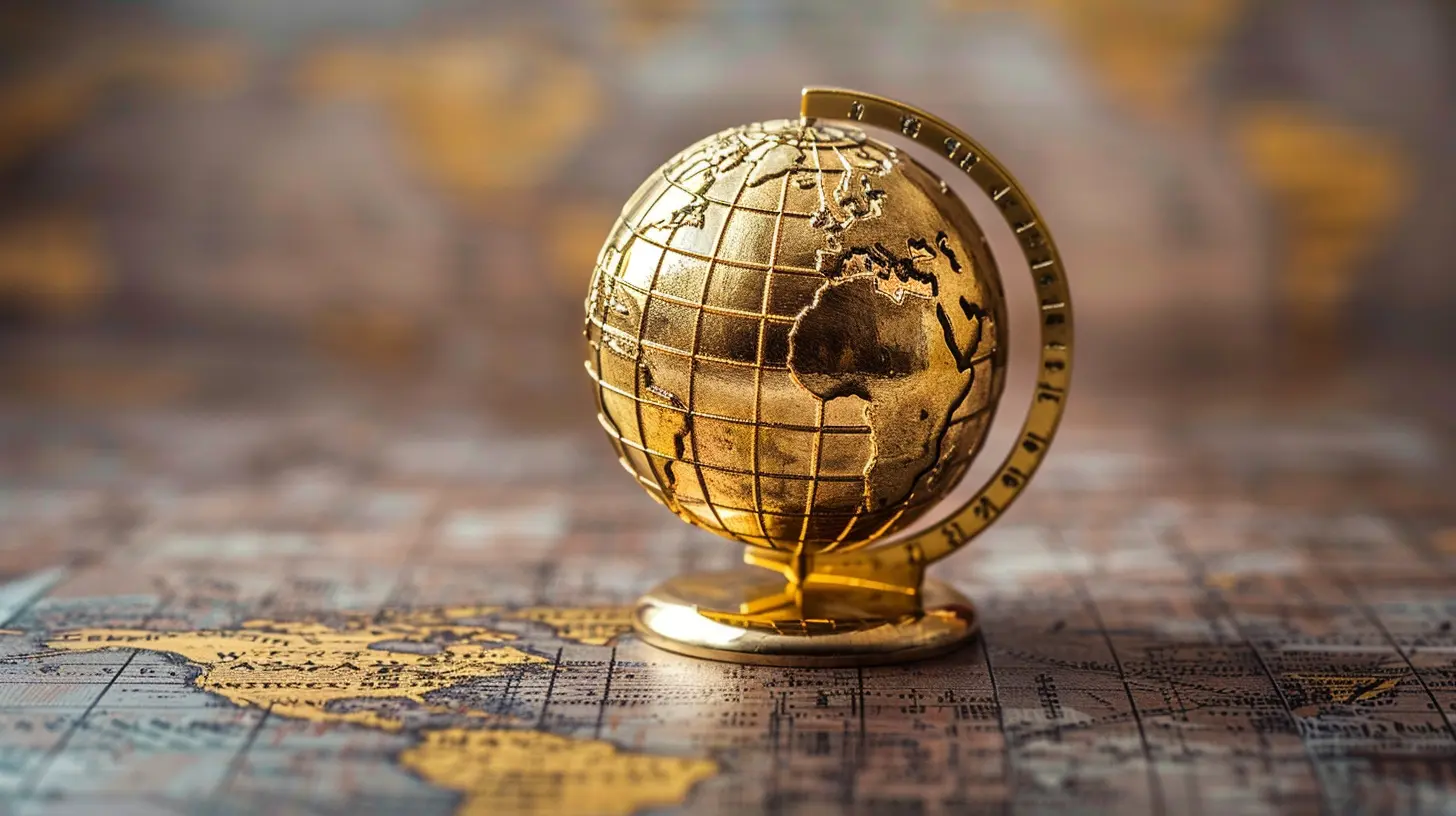How Global Markets Affect Wealth Management Strategies
27 October 2025
In an increasingly connected world, the financial lives of individuals are more impacted by global markets than ever before. Whether you’re investing for retirement, managing a family estate, or planning long-term wealth creation, what happens overseas can hit closer to home than you might think.
Let’s chat about something that sounds a bit intimidating but is actually super relevant (and kind of fascinating)—how global markets affect wealth management strategies. Stick with me here, because understanding this stuff could seriously step up your financial game.
What Are Global Markets, Anyway?
Before we dive into the nitty-gritty, let’s get on the same page. Global markets refer to the interconnected economies and financial systems of countries across the globe. We're talking stock markets, bond markets, commodities, currencies—you name it.When China tightens its trade policies, or Europe faces inflation spikes, it doesn’t just stay over there. Nope. It flows through investment portfolios, business decisions, and even your personal financial planning.
Global Market Movements: The Butterfly Effect in Finance
Ever heard of the butterfly effect? It’s the idea that a small change—like a butterfly flapping its wings—can trigger massive consequences elsewhere. In finance, this plays out when a downturn or breakthrough in one region sends shockwaves around the world.Let’s say oil prices spike in the Middle East. That can bump up gas prices here. And guess what? That means higher transport costs for businesses. Which might lead to price hikes. Which could mess with inflation. Which might make central banks shift interest rates. And suddenly, boom—your investments and savings face new challenges.
See how everything’s connected?
Why Should Wealth Managers Care?
Wealth management is all about growing and protecting assets over time. To do that, we’ve got to understand the forces at play. Global markets are like the weather system of the financial world. If you're planning a financial journey, wouldn't you want to know whether it’s going to be sunny or stormy?Here’s why global trends can't be ignored:
- Market Volatility: International events cause ripples that can tilt markets rapidly. Think Ukraine conflict, U.S.-China trade wars, or Brexit.
- Currency Fluctuations: A weakening or strengthening U.S. dollar can impact returns on international investments.
- Inflation & Interest Rates: These are heavily tied to global economic health and central bank decisions.
- Emerging Market Growth: Countries like India and Brazil present both opportunities and risks.
- Supply Chain Issues: A factory shutdown in Taiwan can affect product availability—and stock performance—everywhere.
Diversification Gets a Global Upgrade
You’ve probably heard the phrase, “don’t put all your eggs in one basket.” In finance, that’s called diversification. But here’s the scoop: in today’s world, true diversification doesn’t stop at domestic borders.Smart wealth managers spread investments across regions, industries, and currencies. Why? Because when one part of the world is struggling, another might be booming. Global diversification helps balance risk and improve long-term returns.
Think of it like this: if you’re a farmer, would you only plant one crop in one field? Nah, you'd mix it up, use different plots, and maybe even try a greenhouse. Same vibe with global investing.
Spotting Global Trends = Better Timing
Nobody has a crystal ball, but keeping an eye on global markets can give wealth managers some pretty solid clues.Let’s say technology is booming in Southeast Asia. A wealth advisor might recommend investing in a tech ETF that tracks companies in that region. Or maybe green energy policies in Europe suggest a surge in sustainable investments. This forward-thinking mindset helps craft strategies that aren't reactive—they're proactive.
Timing isn't about guessing the perfect moment. It’s about reading the winds and adjusting your sails before the storm hits.
How Geopolitical Events Shake Things Up
We can’t talk global markets without touching on geopolitics. Elections, trade agreements, wars, sanctions—they all shape economies.Take the 2020s so far. Between a global pandemic, war in Ukraine, and supply chain meltdowns, wealth managers had to pivot fast. Strategies shifted from aggressive growth to capital preservation. Risk assessments were updated. Even cash holdings became more strategic.
This isn’t fear-mongering. It's just being real. Smart wealth strategies stay agile to navigate the choppy waters of global uncertainty.
The Role of Central Banks and Monetary Policy
When the U.S. Fed raises interest rates, it doesn’t just impact American wallets. It affects global capital flows, emerging market debt, and currency valuations.Wealth managers closely watch the moves of major central banks like:
- U.S. Federal Reserve
- European Central Bank (ECB)
- Bank of Japan (BOJ)
- People’s Bank of China (PBOC)
These institutions pull the levers that influence everything from bond yields to real estate prices. Understanding their policies can help fine-tune an investment or withdrawal strategy.
Global Tech and Innovation: The New Frontier
Tech is no longer confined to Silicon Valley. Innovation is global now. Think South Korea's dominance in 5G, Sweden's fintech revolution, or Africa’s leapfrog into mobile banking.Wealth managers are tapping into these trends to:
- Identify high-growth sectors.
- Invest in international tech ETFs.
- Support sustainable and socially responsible innovations.
If you’re not paying attention to global innovation, you might miss the next big wave of wealth creation.
Inflation: A Global Puzzle with Local Impacts
Inflation isn’t just a local issue. It’s like hot sauce—it spreads fast and hits hard.When inflation spikes globally, central banks respond with interest rate hikes. That raises borrowing costs, affects corporate profits, and influences market performance. For wealth managers, inflation is a silent thief, and global trends can either fuel or tame it.
Managing wealth in an inflationary environment means choosing the right assets: real estate, commodities, inflation-linked bonds, and even select stocks that perform well during price hikes.
ESG and Global Responsibility in Wealth Management
Environmental, Social, and Governance (ESG) investing has gone mainstream—and it's very global.Investors want their money to reflect their values. That means supporting companies that:
- Reduce carbon emissions.
- Treat employees fairly.
- Behave ethically.
Global markets offer a wider lens to invest responsibly. A wealth manager who aligns strategies with global ESG trends isn’t just boosting returns—they’re helping shape a better world.
Currency Exposure: Double-Edged Sword
Investing internationally exposes portfolios to currency risk. If the dollar strengthens, foreign investments may lose value when converted back. But this isn’t always bad news.Some wealth managers actually use currency exposure as a tool—hedging against market drops or creating new opportunities. It’s about being strategic, not scared.
Think of currency like the seasoning on your investment meal—it can make things spicy, but with the right recipe, it enhances the overall flavor.
Long-Term Mindset in a Globalized World
It’s tempting to get caught up in headlines and short-term panic. But here’s the deal—true wealth management is a marathon, not a sprint.Yes, global markets are unpredictable. But they also offer immense opportunity. Countries develop. Markets evolve. New industries emerge out of nowhere.
The trick is to stay grounded. Diversify globally. Adjust as you learn. And keep the big picture in mind.
Working With a Pro: The Global Advantage
Trying to keep up with global finance solo? That’s a full-time job. Wealth managers bring expertise, tools, and experience to the table. They read obscure economic reports so you don’t have to. They run risk scenarios and study trade treaties before making a move.Think of them as the GPS for your financial journey. Sure, you could take the wheel yourself—but wouldn’t it be nice to have expert navigation?
Final Thoughts: Global Markets Are Part of Your Financial Story
So, how do global markets affect wealth management strategies? The answer is—more than you might’ve imagined.They shape risks. They spark opportunities. And they challenge wealth managers to think bigger, broader, and bolder.
If you’re serious about securing your financial future, ignoring global markets is no longer an option. Instead, embrace their complexity, stay curious, and work with someone who can guide you through the ever-changing financial landscape with confidence.
Remember, wealth management isn’t about reacting to every bump in the road. It’s about understanding the road itself—and the weather, traffic, and conditions far ahead.
Ready to go global with your wealth strategy? It might just be the smartest move you make.
all images in this post were generated using AI tools
Category:
Wealth ManagementAuthor:

Uther Graham
Discussion
rate this article
1 comments
Starling Fisher
This article effectively highlights the intricate relationship between global markets and wealth management strategies. It emphasizes the need for adaptive approaches in response to market fluctuations, ensuring that investors remain well-informed and prepared. A balanced perspective on risk and opportunity is crucial for successful wealth management.
November 6, 2025 at 5:51 AM

Uther Graham
Thank you for your insightful comment! I'm glad you found the article's emphasis on adaptability and the balance of risk and opportunity valuable for effective wealth management.


